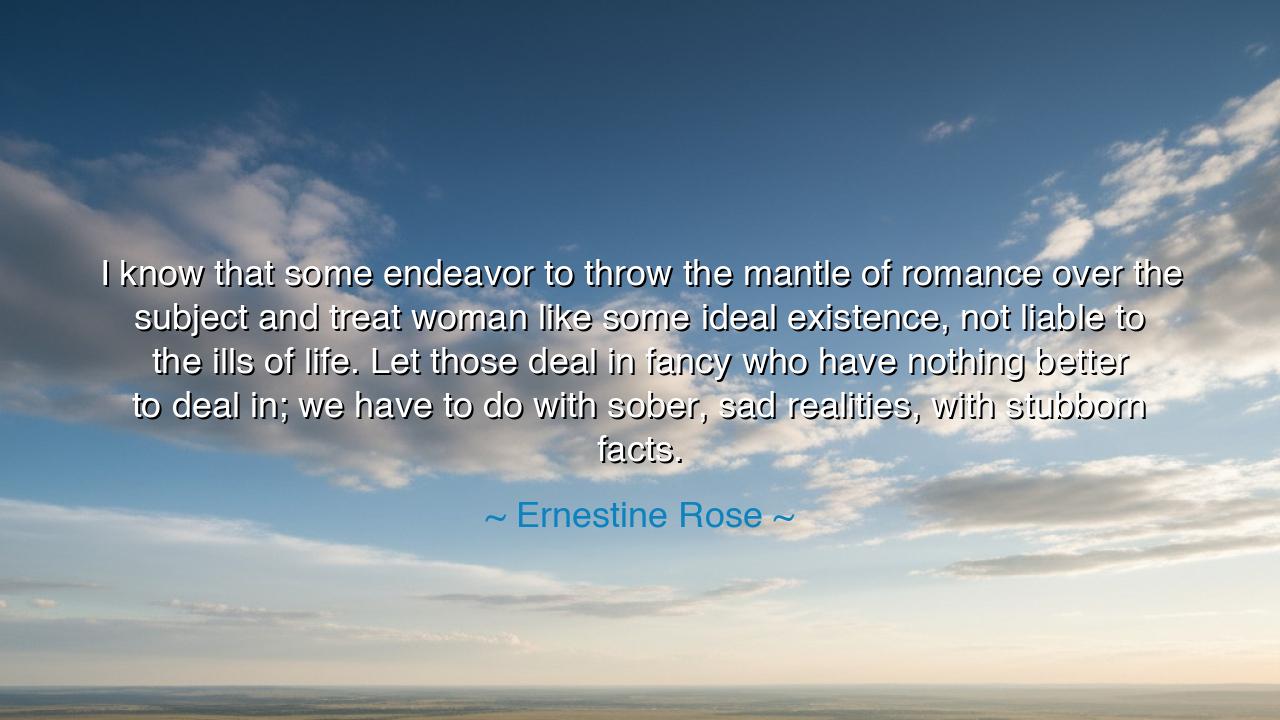
I know that some endeavor to throw the mantle of romance over the
I know that some endeavor to throw the mantle of romance over the subject and treat woman like some ideal existence, not liable to the ills of life. Let those deal in fancy who have nothing better to deal in; we have to do with sober, sad realities, with stubborn facts.






Hearken, children of reflection, to the words of Ernestine Rose, who proclaims: "I know that some endeavor to throw the mantle of romance over the subject and treat woman like some ideal existence, not liable to the ills of life. Let those deal in fancy who have nothing better to deal in; we have to do with sober, sad realities, with stubborn facts." In these words lies a meditation upon truth, realism, and the courage to confront life without illusion. Since the days of the ancients, philosophers and reformers have cautioned that idealization may comfort the mind, but it cannot govern reality, and those who live in fantasy alone risk neglecting the lessons that hard truths provide.
The ancients understood that recognition of reality is the foundation of wisdom. Plato, in his allegory of the cave, teaches that the shadows of appearances may deceive, and only by confronting the substance of life can one gain true knowledge. Rose’s insistence upon dealing with sober, sad realities and stubborn facts echoes this timeless principle: the life of women, and indeed of all human beings, is marked by challenges, struggles, and the necessity of practical engagement, not merely poetic idealization.
Consider the life of Hypatia of Alexandria, whose intellect and courage placed her among the great philosophers and mathematicians of her age. Yet, unlike the idealized representations of women in myth and legend, Hypatia contended with political turmoil, gendered hostility, and mortal danger. Rose’s critique of the ideal existence resonates here: reality demands acknowledgment of struggle and resilience, and it is only by facing these truths that one can act meaningfully in the world.
The quote also challenges the notion that romance or fancy is sufficient for the understanding of human condition. Rose asserts that some prefer illusions because they have "nothing better to deal in," reminding us that contemplation of life must engage both heart and mind, tempered by experience and reason. The role of woman in society, as Rose argues, is not to be clothed in idealized perfection, but to navigate the tangible ills of life with intelligence, courage, and resolve.
Furthermore, Rose’s words illuminate the moral imperative of realism. To confront stubborn facts is not pessimism but a recognition of agency. When women and men face reality squarely—acknowledging injustice, inequality, or hardship—they are empowered to act with efficacy rather than passivity. Historical examples abound: Elizabeth Cady Stanton, though inspired by ideals, engaged directly with the realities of legal and social oppression, transforming advocacy into tangible reform.
The lesson of Rose’s reflection is enduring: do not be swayed by comforting illusions or the seduction of idealization. True understanding demands attentiveness to facts, endurance in the face of hardship, and courage to act upon truth, however sad or inconvenient. To engage with the world sincerely is to equip oneself to effect genuine change, rather than merely admire the world from a distance of fantasy.
Practical actions follow naturally. Observe life as it is, not as one wishes it to be. Acknowledge challenges and inequities openly. For those in positions of influence, act decisively to address them; for those seeking personal wisdom, cultivate discernment and courage. In confronting realities with clarity and determination, one mirrors the example of Rose and other visionaries who refused the false comfort of romance alone.
Remember, children of the ages, that wisdom is born of truth, not illusion. Ernestine Rose’s words illuminate the eternal principle that engagement with sober, sad realities and stubborn facts is the path to moral strength, insight, and effective action. By rejecting fantasy in favor of clarity, we honor life as it is, empowering ourselves to navigate its trials with courage, intelligence, and enduring purpose.






AAdministratorAdministrator
Welcome, honored guests. Please leave a comment, we will respond soon